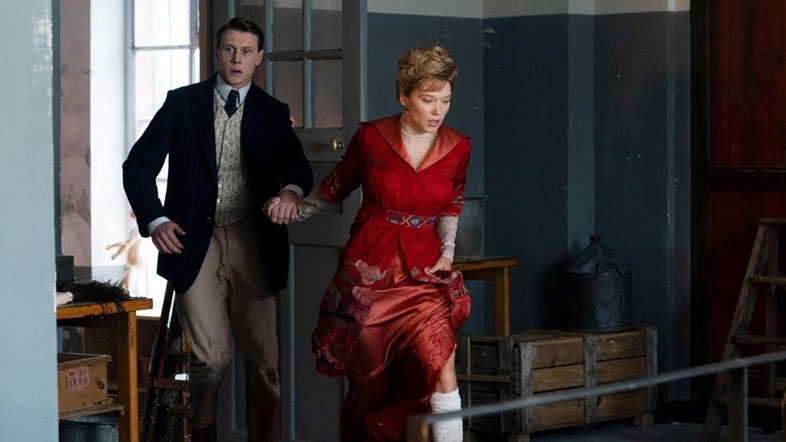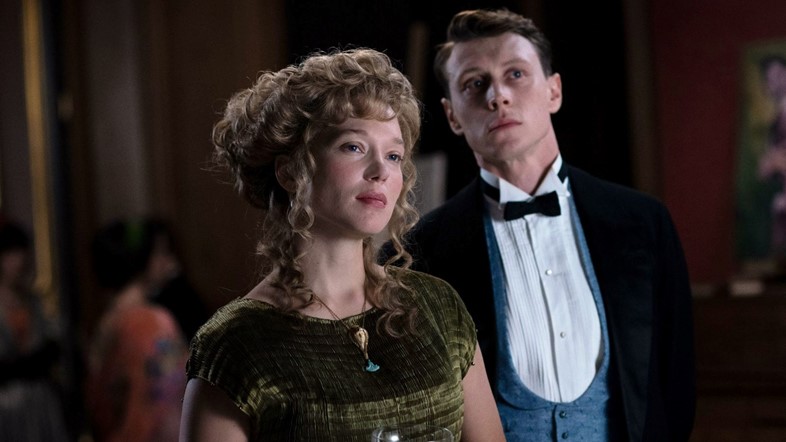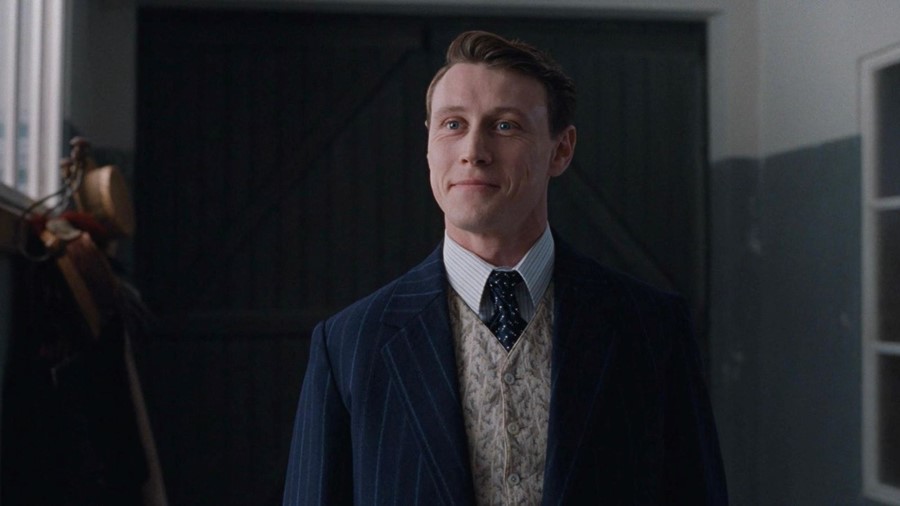As Bertrand Bonello’s daring new sci-fi The Beast is released, George MacKay talks about acting alongside Léa Seydoux, and playing an English gentleman and an incel all at once
What to say about The Beast, Bertrand Bonello’s daring and irretrievably French sci-fi head-scratcher starring Léa Seydoux and George MacKay? The best description I can muster is that it’s a romantic-science-fiction-horror flitting back and forth between Belle Époque Paris, 2014 Los Angeles and a dystopian near-future in which AI has assumed control of society – all with our best interests at heart, naturally. It’s a film that wears its philosophical pretensions on its sleeves. And my, has it got very long sleeves.
But really, Mackay says, it all boils down to something quite simple: “It’s about two people who bond over this sense of existential foreboding, this feeling that things are going to fall apart. And it manifests in the metaphor of this beast, always out of sight, which is going to attack. And so the thing that connects them is the reason they can’t be together.”
A tragic romance, then. Was there not some easier way to say it? I tell MacKay I can’t for one second imagine a film like this being made in the UK. It’s too … “Existential? I know what you mean,” the actor smiles. “Admittedly this is kind of a difficult film [but] I’m so proud of it. It was thrilling, you know? One minute I would be at a party [in 1910] talking about the Stoics and then we’d cut to a verbatim monologue of an incel killer, all in and out of French and English dialogue.”
Loosely inspired by Henry James’ 1903 novella The Beast in the Jungle, Bonello’s film tells the story of Gabrielle (Seydoux), a woman who chooses to undergo a DNA ‘purification’ process to expunge past-life traumas and secure meaningful work. This bit unfolds in 2044, with AI in charge of humanity in the wake of some undisclosed catastrophe.
As Gabrielle begins the procedure, we meet her past self in 1910 Paris, where she rekindles her connection with an English gentleman, Louis (MacKay), who is drawn to her deep and abiding fear of the future. Then there’s 2014 Gabrielle, an aspiring actor house-sitting for a wealthy LA family while somewhere across the city Louis, now reborn as an incel, plots his revenge against womankind. (This incarnation of Louis is based on a real character, Elliot Rodgers, who went on a killing spree at the University of California in 2014.) 2044 Louis is more of a blank space, until a last-act twist that will leave you gasping.

It seems a weird leap of logic to suggest these three male characters, separated by centuries as well as psychotic intent, are in fact one and the same. But it’s a conundrum that MacKay enjoyed digging into. Having begun acting for the screen in PJ Hogan’s 2003 Peter Pan adaptation, the British performer has followed a starring role in Sam Mendes’ 1917 with increasingly complex turns in Bonello’s film and Femme, a queer revenge thriller tackling toxic masculinity released last year. (Next up, he’ll star with Tilda Swinton in an apocalyptic new film from The Act of Killing’s Joshua Oppenheimer, The End.)
“In 1910, Louis doesn’t have to commit; he just has to tempt [Gabrielle] away from her marriage,” muses MacKay, drawn by his own admission to roles that examine the vagaries of identity. “He might have a great night and be gone in the morning to read Rimbaud and drink coffee and smoke cigarettes. You know, he’s sort of terrible in his looseness to her. Whereas in 2014 you have the internet and this high-achieving [American] culture where the volume is turned up so much … If you’re a fearful person in that environment it can rot you, because it’s just too unattainable, you know, and that’s why he went so dark and so inwards.”
MacKay boarded the project as a replacement for the late Gaspard Ulliel, who died after a skiing accident in 2022. Feeling that the role could not be played by another Frenchman, Bonello got MacKay to read with Seydoux in Paris, an experience the actor describes as “intimidating, but also really exciting. That first scene is about a sort of frisson and thrill at being in Gabrielle’s company. And so then of course I had those feelings to draw on, getting to read a scene with Léa.” (His French isn’t too shabby, either.)

Exactly how Gabrielle’s presentiment of disaster will play out is a big part of The Beast’s unnerving power. There’s a thread of fear running through the whole that’s perhaps the most persuasive thing going for it, Bonello nodding to the likes of David Lynch (a bone-chilling scene with an online fortune teller) and Dario Argento (a beautiful underwater sequence recalling Inferno) in pushing our buttons. It’s a film as much about our fear of the future – Yeats’s “rough beast” of the apocalypse – as it is about the fear of love, and Louis is its symbol. “There was something kind of terrible about him, in all versions of him, which I was kind of quite excited about,” says MacKay, bringing our time to an end.
The Beast is out in UK cinemas now.
